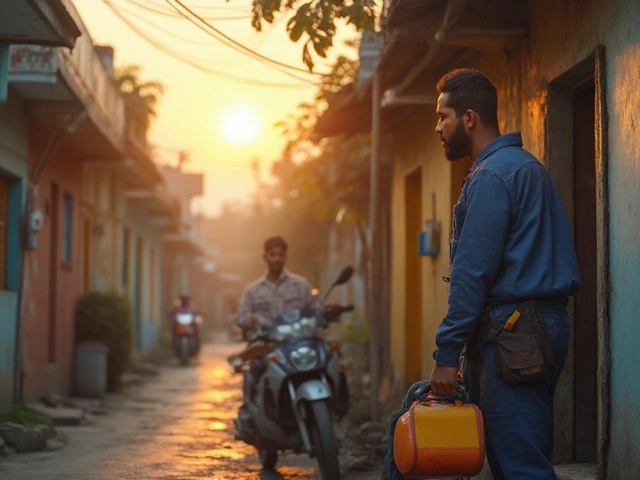Fifty doesn’t have to mean finished. If you’re itching for a real career change and considering becoming a Physician Assistant (PA) in India, you’re not alone. Mid-life career pivots are way more common these days, and healthcare is desperate for people with life experience. The big question—can you actually become a PA at 50? The answer’s a lot simpler (and more positive) than you might think.
Certificate courses for PAs in India aren’t just for fresh grads. Most don’t have hard age cutoffs. As long as you meet the education requirements—usually a background in science at the class 12 level—you can apply. Some programs are flexible about work experience or your reason for wanting to switch fields. If you’re organized, motivated, and ready to learn, age rarely gets in your way when it comes to admissions.
The medical field likes maturity. Hospitals often value older PAs for their patience and communication skills. Sure, you might worry about keeping up with younger classmates or mastering new tech, but lots of mature students actually fly through coursework—they already know how to take responsibilities seriously. If anything, your experience with people and problem-solving can help you stand out once you’re in the hospital or clinic.
- Why Age Isn't a Dealbreaker
- The Basics: PA Certificate Courses in India
- What It Really Takes: Skills and Admissions
- Real Challenges, Real Solutions
- Life as a 50-Something PA
- Tips to Make the Leap Work
Why Age Isn't a Dealbreaker
If you're worried that being 50 means the healthcare world won't take you seriously, think again. Hospitals in India, and honestly everywhere, are running short on skilled health workers. The demand for Physician Assistants keeps growing—especially since the COVID-19 pandemic. According to data from the Indian Society of Physician Assistants, about 15% of their newly registered members in 2024 were over 40. Age is less of a wall and more like a small speed bump.
Older students bring a ton of real-world experience that employers value. Think stress management, talking to patients, and handling tough situations. Medical settings need people who can use common sense, show patience, and not panic when things get chaotic. Many hospitals actually appreciate hiring mature PAs because they’re seen as responsible and calm under pressure.
| Year | Percentage of PA Students Over 40 |
|---|---|
| 2022 | 10% |
| 2023 | 12% |
| 2024 | 15% |
And here’s something folks often miss: learning doesn’t slow down as much as you think. Research from the All India Council for Technical Education showed people in their 40s and 50s do just as well as younger classmates in certificate programs—especially when they’re motivated and organized.
- No age restrictions on many become a PA at 50 programs
- Real-life work and people skills are a plus in practical training and job interviews
- Mature graduates often find jobs just as quickly as younger ones
If you’ve put off chasing this goal just because of your age, you’re more than likely overthinking it. Most programs just want to know that you can commit, learn, and show up ready to work every day. That’s something a 50-year-old can easily handle—and sometimes better than a 20-something.
The Basics: PA Certificate Courses in India
If you’re aiming to become a Physician Assistant (PA) at 50 in India, it helps to know exactly what you’re signing up for. A PA certificate course is a program designed to teach you clinical and practical medical skills so you can work alongside doctors. These courses don’t make you a doctor, but you’ll learn enough to handle a ton of medical tasks like taking patient histories, assisting in surgeries, giving first aid, and more.
Most places that offer PA courses require at least a 12th-grade science background (mostly biology, chemistry, and physics). Some private institutions even let you in if you’re a science graduate or come from nursing or paramedical backgrounds.
- Course Length: Usually 1.5 to 2 years. A few go up to 3 years.
- Cost: Fees start around ₹45,000 and can go north of ₹2 lakhs depending on the institute and whether you’re aiming for a simple certificate or a full-time diploma.
- Mode: Many programs are in person, but India is catching up with blended/online models, especially after COVID-19.
Below is a snapshot of some well-known PA courses and their basics:
| Institute | Course Name | Duration | Approx. Fees (INR) |
|---|---|---|---|
| CMC Vellore | PA in Emergency Medicine | 2 years | 1.2 lakhs |
| Manipal Academy of Higher Education | Diploma in Physician Assistant | 1.5 years | 95,000 |
| Medvarsity (Apollo Hospitals) | Certificate in Physician Assistant | 6-12 months (online) | 45,000 |
| Symbiosis Institute | Diploma in PA Studies | 2 years | 1.5 lakhs |
Certificate courses are lighter and quicker. Diploma ones are more detailed and might look better if you want to work at big hospitals. Either way, every legit course comes with a mix of classroom learning, actual hospital practice, and regular exams.
One big tip? Always double-check that the course is recognized by proper bodies (like the Indian Medical Association or a state health council), especially if you plan to work in hospitals with tough hiring rules.
What It Really Takes: Skills and Admissions
Getting into a PA certificate course in India isn’t rocket science, but it does have some clear basics. First off, programs almost always ask for a 10+2 (or equivalent) with science subjects—biology is a must, and chemistry can really help. A few private institutes might even want a paramedical or nursing background, but that’s not the norm.
The right skills don’t end at grades and certificates. Colleges—and employers—want to see if you’re quick on your feet, organized, and good at talking to all sorts of people. Being a PA means doing a mix of hands-on patient care and paperwork, so being cool under stress is a bonus. Communication is huge. Doctors and nurses rely on you to ask smart questions, spot problems early, and explain things clearly to patients who might be nervous or confused. If you’ve already worked in another field, those people skills will give you a leg up.
- become a PA at 50 — That phrase alone often sets off questions about eligibility, but there’s no age barrier in almost any PA certificate or diploma program in India. Life experience is a big plus, not a minus!
- Written tests: Some institutes use a basic written entrance exam, but it’s mostly science from class 12 level. If you’ve been out of school for a while, a bit of brushing up goes a long way.
- Face-to-face interview: A bunch of programs do short interviews to check your motivation and see if you understand what PAs do. Simple tip—read up on the role before you go, and be honest about your reasons for switching careers.
Here’s a little cheat sheet on typical eligibility and course details from leading colleges in India:
| Requirement | Typical Criteria |
|---|---|
| Education | 10+2 with Science/Biology |
| Age Limit | No upper limit (most certificate programs) |
| Selection | Direct Admission or Entrance Test + Interview |
| Course Length | 1 year (certificate), 2-3 years (diploma/degree) |
Don’t let old worries about textbooks or competitive exams hold you back. Institutes aren’t expecting you to know everything from the start—they want people who can learn fast, show empathy, and handle responsibility. That’s where being a little older can actually work in your favor.

Real Challenges, Real Solutions
No point sugarcoating it—jumping into PA training at 50 will have some hurdles. Age isn’t just a number when you’re sharing the classroom with people fresh out of college. But here’s the twist: most of these hurdles are common, and most have workarounds.
The first challenge is often stamina. Healthcare shifts are long. Certificate courses for PAs in India can run from 18 months to 3 years, with a lot of standing, late-night studying, and even night shifts in hospitals. But physical fitness isn’t about age as much as habits. Getting used to moving more now, before the course starts, can save you trouble down the line.
Then, there’s tech. Even paperwork has gone digital in hospitals. If you haven’t used medical software or electronic records, the learning curve can feel steep. According to Dr. Neha Rastogi, a senior PA trainer in Delhi,
“We’ve seen mature students pick up hospital software as quickly as younger ones, once they get over that initial hesitation. The key is not being afraid to ask for help.”
Next up—finances. Most PA certificate programs cost between ₹1.5 to ₹3 lakh, depending on the institute and if it’s private or government-run. Many mature students already have family responsibilities. It helps to set money aside well in advance or look for scholarships aimed at career-changers.
| Challenge | Quick Solution |
|---|---|
| Keeping up physically | Start light daily exercise; build stamina |
| Adapting to tech | Take free online classes on basic hospital software before your program starts |
| Balancing family/work | Ask for flexible shifts during internships if possible |
| Funding your course | Check for government subsidies and private scholarships |
One more thing: self-doubt. Feeling out of place is normal at first. Most mature students in PA courses report that their confidence grows once group projects start rolling, since team-based tasks often play to their social and leadership skills.
The bottom line—most issues people face when they decide to become a PA at 50 are fixable. The trick is getting specific about your worries, then building a plan for each one. And you’re definitely not the first person to do this.
Life as a 50-Something PA
Jumping into the healthcare world as a PA at 50 doesn’t look like a midlife crisis—it can feel like a fresh start. People in their 50s bring steady nerves, patience, and a sense of calm that younger colleagues are often still figuring out. Indian hospitals and clinics are noticing these strengths more, especially since healthcare teams are made up of all ages.
Here’s the good news: You don’t need to run around the hospital all day like you’re in an action movie. Most Physician Assistants work regular shifts, have set schedules, and often work in tight-knit teams. A lot of employers say experienced adults bring focus to tough situations and don’t panic when things get intense. Communication is a big deal in medicine, and if you’ve spent decades working with people, you’re already ahead of the game.
Check out what daily life can look like in India for a PA at 50:
| Aspect | Reality for a 50+ PA |
|---|---|
| Work Hours | 8–9 hour shifts, sometimes daytime only, with occasional weekends |
| Physical Demands | Mostly standing, walking, and patient interaction; not as physically rough as being a nurse |
| Responsibilities | Patient assessments, medical histories, basic procedures, follow-ups |
| Colleague Interactions | Trusted as a mentor and sounding board, even by doctors |
| Salary (2024 average in India) | ₹3–6 lakhs per year starting out, higher with experience |
A lot of PAs over 50 mention that patients actually trust them more. People feel comfortable sharing sensitive stuff with someone who looks and sounds like their parent, not just another junior in a white coat. That trust makes a difference, especially in fields like family medicine or emergency care.
There are challenges, of course. Learning medical tech and apps can feel weird at first, but most PA courses in India cover this from the basics. Building stamina is important, too. Starting with part-time or posted shifts, if available, can help get your body used to new routines without burning out. And don’t forget, while younger colleagues may know the latest lingo, you’ve got experience they don’t teach in books.
If you’re thinking about becoming a physician assistant, don’t get discouraged by age. Many hospitals prefer mature PAs for their reliability and real-world skills. As more healthcare centers open across India’s cities and smaller towns, they need team members who can handle tough days and care for patients of all ages. Your age could be your superpower, not your setback.
Tips to Make the Leap Work
Switching careers at 50 might sound scary, but lots of people have pulled it off—especially in healthcare. If you're serious about becoming a Physician Assistant at 50, these steps and tips will help you stay on track.
- Pick the right course: Tons of PA certificate programs are available in India, but not all fit mature students. Check for programs that offer flexible schedules, online learning options, or weekend classes if you’re balancing work or family.
- Tap into your support system: Family, friends, or even a study group will make the study grind a lot easier. Group study can help keep you accountable and motivated, especially if you haven’t been in a classroom for ages.
- Build key skills early: Brush up on your biology and chemistry. Online platforms like SWAYAM and Coursera have free crash courses designed for Indian students. Getting the basics fresh in your mind pays off when the syllabus gets tough.
- Master your tech basics: Hospitals everywhere rely on digital records. If you’re rusty with computers, take a short digital literacy course. Sites like NPTEL offer basic computer skills in simple Hindi and English.
- Network with others: Join healthcare forums or WhatsApp groups for PA students. You’ll get real stories, job leads, and tips from people your age making the same move.
- Don’t skip the internships: Indian PA courses usually come with hands-on training. Older students often say practical sessions help way more than theory—use this time to show your work ethic and people skills.
If you’re wondering what the odds are of people your age making a switch, take a look at some data:
| Age Group | % of PA Students (India) | Completion Rate |
|---|---|---|
| 20-29 | 56% | 88% |
| 30-39 | 23% | 86% |
| 40-49 | 13% | 82% |
| 50+ | 8% | 78% |
Sure, the 50+ crowd is smaller, but the success rate is actually pretty strong. Most finish the course if they start it. If you’re determined, you’re already halfway there.
Last tip—don’t be afraid to ask for guidance. Lots of colleges have career counselors who get this kind of life shift. And, if you ever feel overwhelmed, remember: the Indian medical sector needs more PAs, and age is just a number when you bring dedication to the table.





Write a comment